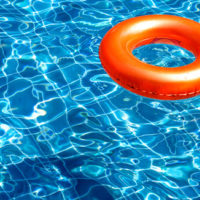Pool Safety In Summer Time

In a Florida summer, having access to a pool is not just a luxury, but a necessity for many people. However, water fun is not without potential cost – 2012 data from the Florida Department of Health shows that the state’s rate of drowning for children aged 1-4 is the highest in the United States. Some pools and watering holes are simply not made safe enough, and if you or a loved one has the unfortunate chance to be injured as a result, you may be able to seek compensation from the landowner.
Premises Liability and Pools
Public pools are held to a somewhat different standard than private pools, but there are certain parts of the law which apply to them all. Pools fall under a legal theory known as premises liability, where a person who is injured in the pool or on the property is potentially able to seek compensation from the owner (this applies to both homeowners and business owners). Depending on the situation of the person, a property owner may owe different levels of due care to them, and failing to exercise it may render them liable.
Florida law recognizes three types of people who may enter onto a specific piece of land. Business invitees are those invited for a specific purpose – public pool guests would fall into this category – and they are generally accorded the highest possible level of protection under the law. A property owner must make their land safe for invitees, and warn of any potential dangers they are aware of. Licensees are those invited onto land for social purposes – usually private pool guests are licensees, granted access by the private homeowner – and they must be warned of any potential dangers. Trespassers are those who are not invited, and no duty of care is owed to them except that the landowner must not deliberately harm them.
Exceptions For Children
While most trespassers are owed no legal protections whatsoever, Florida’s legislature has made an exception for children, due to their young age and inability to appreciate the danger of an unattended condition like a pool. This is referred to as the attractive nuisance doctrine. An attractive nuisance is defined as anything on land that is likely to attract the attention of young children, and swimming pools certainly qualify.
If an attractive nuisance like a pool is on your land, you do not have any duty to warn or protect adult trespassers, but you do have a duty to try and act with reasonable care to protect child trespassers if it is reasonable to assume that one may find the dangerous condition (the pool). The law holds that if these factors apply, and if it is reasonable to assume that a child will fail to appreciate the danger of the object due to their young age, then a landowner may be held liable if a child is injured on their property, even if that child is a trespasser.
Ask A Knowledgeable Attorney For Help
Pool safety is a must, especially in a state like Florida where the sun is out most of the year. If you have been injured or you have had a loved one injured due to someone else’s negligence in operating their pool, you may be entitled to compensation for your injuries. The Tampa pool safety lawyers at the Rinaldo Law Group are happy to sit down with you and try to assist in answering any questions you may have. Call us today to set up an appointment.
Resources:
floridabar.org/news/tfb-journal/?durl=%2Fdivcom%2Fjn%2Fjnjournal01.nsf%2FAuthor%2FF5EDDA415D032B218525767E0071DA90
floridahealth.gov/statistics-and-data/florida-injury-surveillance-system/_documents/data-fact-sheets/drowning-2012.pdf












